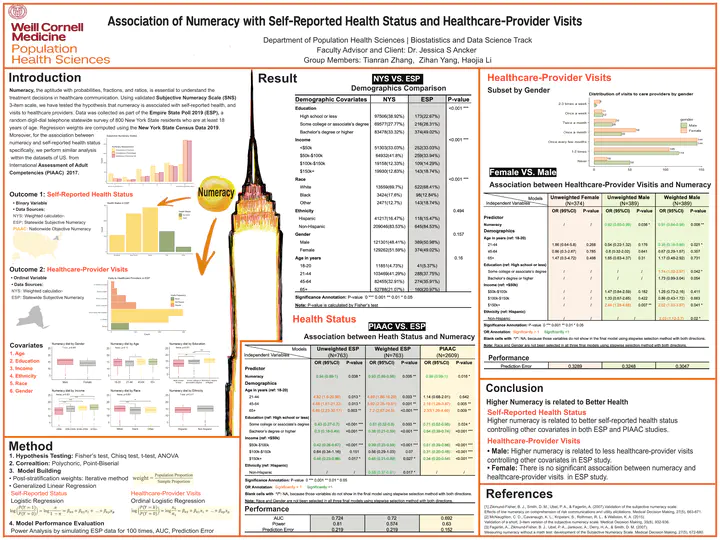 Photo by rawpixel on Unsplash
Photo by rawpixel on Unsplash
Title
Association of Numeracy Scales with Self-Reported Health Status and Healthcare-Provider Visits.
Background
Poor numeracy is likely to affect health because it may interfere with peoples’ ability to understand their health data and instructions from doctors.
Objective
To test the hypothesis that numeracy is associated with (a) self-reported health, and (b) healthcare-provider visits.
Study Design
Two survey studies, a random-digit-dial telephone survey in New York State (Empire State Poll), and an international survey on adult education (PIAAC).
Study Subjects
800 NYS residents aged over 18 in ESP and 3660 US residents aged over 16 in PIAAC.
Study Variables
ESP Predictor: numeracy measured by a 3-item version of the Subjective Numeracy Scale (SNS); Outcomes: self-report health status and healthcare-provider visits in the past 12 months. PIAAC Predictor: numeracy proficiency scale including 56 tasks. For both surveys, demographic covariates include gender, age, education, income, race, and ethnicity.
Results
(a) Weighted multivariate logistic regression on the dichotomized binary health status showed that people with higher numeracy scores tended to be in better health controlling other covariates. Education and income were positively associated with health status, while age was negatively associated with it. The results were similar to those of the nationwide PIAAC data, except that ethnicity was not associated with health status in PIAAC study. The ESP regression overperformed PIAAC regression with a lower AUC.
(b) Though the relationship between numeracy and visits to care providers were not significantly correlated, males and females showed different habits of visiting doctors. There was no association between numeracy and healthcare-provider visits in the female subset of ESP data controlling other covariates. However, the weighted ordinal multinomial regression showed that numeracy was negatively associated with doctor visits for males.
Conclusion
Higher numeracy is related to better self-reported health status. There is a gender difference in healthcare-providers visits that numeracy plays a role in males but not in the female subgroup.
Faculty Advisor: Dr. Jessica Ancker
Client: Dr. Jessica Ancker
Team Members: Tianran Zhang, Haojia Li, Zihan Yang